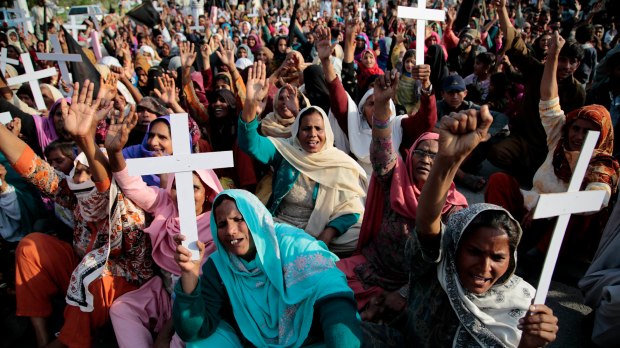My friend Michael, his wife, and three children currently live under self-imposed house-arrest in the giant Pakistani city of Karachi. And all because they are Catholics. Three and a half years ago, Michael was recognized by Muslim extremists, pulled out of the motorized rickshaw he used as a taxi, and beaten almost to death. Then the Islamic militants torched the taxi, destroying Michael’s only source of income.
When I tell this story, people’s first question is often “what can people in America do for the persecuted Church in faraway places like Pakistan?” It’s easy to have a sense of frustration and futility: millions of Christians, particularly in Muslim countries, face all manner of mistreatment and persecution, from humiliation and harassment to abductions, forced marriages, physical assaults, and even death. Can we American Christians, separated by such people by thousands of miles, really do anything?
The answer, unequivocally, is yes. And I should know — when my family and I moved to Bangkok, Thailand, in 2014, I had no idea there was an asylum seeker crisis there, a result of thousands of Pakistani Christians fleeing persecution in their native country. Over the years, I learned to become the advocate of these Christians, many of whom are nothing less than heroes. Here are a few of the things you can do for these marginalized Christian populations.
Prayer
During a recent interview I gave, the host acknowledged that readers and listeners can pray for the persecuted Church. But he also wanted to hear about the more practical ways to help. Yet I would argue that prayer is not only the first place to start, but actually quite practical.
We should begin with prayer first because in encountering any problem, we need Christ’s help to foster an interior disposition of humility, trust, and love. We cannot do anything apart from Christ, and we require the inner spiritual strength that derives from prayer if we want to be of help to persecuted Christians.
But prayer really does accomplish things. I witnessed this firsthand. I saw prayerful Pakistani Christians rewarded in ways big and small: food, schooling, and medical care for their children; friends to advocate on their behalf or visit them when detained by local authorities; and even finding a new home. Four members of one such family resettled to the Netherlands, where they are building a new life. All of this would have been impossible without their many invocations.
Donations
There are actually many organizations that provide financial relief to persecuted Christians, not only in Pakistan, but across the Muslim world. The Knights of Columbus runs one such organization. The United States Conference of Catholic Bishops recommends several. The Barnabas Fund, though not Catholic, is also excellent, and provides many harrowing stories of Christians suffering for their faith today. As someone who regularly gave to Pakistani Catholics who attended our parish in Bangkok, I was always amazed at how even small regular donations made a tremendous impact in the survival of impoverished Christians.
Friendship
Often the terrible problems facing the Church seem remote when we don’t know anyone immediately involved. That was often the case for me before befriending many Pakistani Catholics, who made the suffering of the global Church present to me. Even if there are no Christian communities near you that have a relationship with the persecuted faithful across the globe, there are ways to befriend those in need. The Barnabas Fund, for example, provides a way to support a family or sponsor a child in places where Christians suffer mistreatment.
Advocate
When my wife and I returned to the States, we started contacting politicians regarding the plight of persecuted Christians in Thailand. Often their staffers ignored us. But we also got through: Rep. Chris Smith of New Jersey actually cited some of the stories of my friend Michael during a congressional subcommittee hearing. Our political leaders are going to focus their attention on what their constituents care about, so let them know that the suffering of marginalized Christian communities matters to you — and perhaps send them some literature that educates them about this crisis.
You can also advocate by writing letters to your local newspaper, or even contacting your diocesan newspaper and asking them to feature a story on persecuted Christians. You could also organize an event at your local parish regarding the persecuted Church. This includes inviting a speaker, or doing a novena, or having a Mass said. All of these in their own unique way raise awareness about this crisis, and orient others towards helping those in need.
So join me in this great effort to bring relief and restoration to our brothers and sisters in faith across the world. Not only will you be blessing those desperate for your help. You will find yourself blessed in the process. And, as our Lord Himself told us: “Truly, I say to you, as you did it to one of the least of these my brethren, you did it to me” (Matthew 25:40).
~
Casey Chalk is the author of The Persecuted: True Stories of Courageous Christians Living Their Faith in Muslim Lands (Sophia Institute Press).




